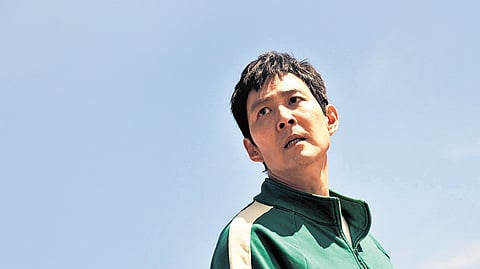Let the gory games begin, again
Even as all things Korean continue to capture the imagination of Indians, if one had to pinpoint the moment where the frenzy became mainstream, it would probably be the release of Squid Game on Netflix in 2021. The dystopian survival thriller series took the world by storm, establishing Korean entertainment as a global force to reckon with.
As the show gets renewed for a second season, Lee Jung-jae and Wi Ha-jun reprise their roles as Seong Gi-hun or Player 456, and detective Hwang Jun-ho respectively, with the Hwang Dong-hyuk directorial promising more drama, and even more action. Excerpts from the interview:
‘I Want to Showcase My Versatility’
Lee jae-hun
Your character Gi-hun aka Player 456, the only survivor and winner of 38.6 million dollars, in 'Squid Game' is retracing his steps back to where it all began. What was it like to revisit him?
When I heard we were back for season 2, I found it funny how things had panned out for us, and the show. It took us three years to make the new season, and I feel had we known beforehand that we would have a follow-up season, we could have possibly shrunk the time in the initial episodes.
After two years, I was back on sets as Gi-hun, wondering how best could I portray this man once again. I remember the first day when I put on Gi-hun’s make-up and attire, I arrived on the set with mixed feelings. I had never felt this way before, it was something new as well as strange, maybe like the character and his arc. It is different, with a new cast and characters, and I have had an enjoyable year shooting.
What was that one aspect of Gi-hun’s personality you tried to understand while playing him?
The way one saw Gi-hun in Season 1 is very different from the way he will be seen now. But you will see glimmers of his optimistic and helpful nature. I seized every opportunity to move towards his inherent goodness. He was a man whose approach was dictated by his conscience. I was inspired by the Korean proverb, “A conscience that doesn’t lead to action is not working well”. So while shooting this season, where the games are almost war-like, I asked myself, is my conscience working like Gi-hun’s? That was my cue for getting under the skin of my character.
Why do you think 'Squid Game' resonated with audiences worldwide?
The games were fairly simple, straightforward and fun. People could easily try them out themselves. The concept of a children’s game woven into the narrative was very intriguing. For example, the Dalgona or honeycomb challenge is very entertaining with many trying them out at home. The music was also very catchy. The story also served as a telling social commentary of our times, and it was that aspect which struck a chord with audiences.
You have created cinematic history. You became not just the first Asian actor to win the Emmy for 'Squid Game', but also the first Asian to play the Jedi Master in 'Star Wars Acolyte'. What is your process as an actor?
Actors do not always get to choose their roles; rather, we are selected. I had always hoped that a good part would come my way. What is of prime importance for me is to showcase my versatility and the ability to perform different roles in various genres as well as reflect varied emotions. I am very grateful that I have had the opportunity to play characters like Gi-hun, as well as Master Sol. I think my past experiences have helped me understand my craft succinctly. I endeavour to constantly push myself and hope to continue garnering opportunities for myself.
‘I Choose Characters Similar to Myself’
Wi ha-jun
Season 1 ended on a cliffhanger. Hwang Jun-ho makes a startling discovery and is betrayed by his brother, the Front Man. Jun-ho has returned, but with an agenda. Tell us how you made the character your own.
First of all, I am delighted that we are back for another season. In fleshing out my character, my focus was on the fact that he had gone through several shocking events and nearly lost his life. My emphasis on understanding his personality was to channel the aspects of fear and rage since he is feeling both in equal measure.
What can you share about your character’s arc in the new season?
He is faced with the mission of uncovering the truth, exposing the gross injustices, and searching for his brother. I think the last three years have been lonely and difficult for him. His journey in season 2 is fraught with challenges and shaky situations through which he remains unshaken, and in portraying him, I focused on his unwavering gaze.
Season 2 also explores the relationship between Jun-ho and his brother In-ho in greater depth. In what ways does their relationship impact the story?
This season digs deeper into their narrative. They are brothers, but the details of how In-ho impacted Jun-ho’s life remains unclear. But my own understanding of the narrative is that their childhood environment was not a good one. As the older brother, In-ho was a father figure for him, so much so that Jun-ho followed in his footsteps and became a cop. Thus, he is unable to let go, and is searching for him relentlessly.
You play the detective in 'Squid Game', the mafia boss in 'The Worst Evil', an activist in 'Gyeongseong Creature' and an instructor in 'Midnight Romance in Hagwon'. Do you feel the need to personally relate to your characters?
I look at various references and try to approach the characters while understanding their background, situation and emotions rather than characteristics, in terms of the degree of expression and appearance. I usually try to challenge myself with various roles, but I think I choose characters that are similar to myself to some extent.

